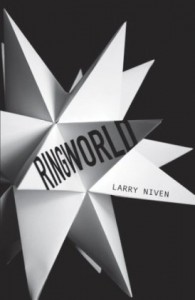69
Readers
96
Writers
Ironic Contradictions
I'm a long time reader - since way back when I was seven. That makes it over three quarters of my life that I will be a reader for. But it is worth it.
When I'm not reading or wasting my time online on here or Goodreads I'll be off playing video games, studying teaching and messing around with friends and pop culture. Or reading some more.

What is Ringworld?
Ringworld is a curiously contradictory science fiction novel. For a novel so concerned with the finer details of the exact science of alien technology it also features some bizarrely pseudo-scientific fantasy conceptions. However, it's use of technology and its ideas are an indication alone as to why it should be read despite some major flaws which become more obvious as the reader delves further into the story.
Larry Niven's novel is claimed as a major influence of the critically acclaimed Halo videogame series. It is not difficult to see the inspiration taken from this novel with the ideas of the Engineers and the large Ring shaped world which make up the central component of this novel. The nature of exploration and the discovery of a mysterious history on the world also bear similarities to the game series. However, where Halo is the tale of wars between humans and aliens this novel is the tale of aliens working together with humans to work out what the mysterious ring structure is.
Flaws
The flaws of the novel are numerous and indeed detract from the magnificence of the ideas present. After all, it is staggering to think about the fact that it could possibly take ships travelling at lightspeed practically ages to slow down again. And that is one of the groundbreaking scientific thoughts that Niven analyses in his novel. Yet, unfortunately the flaws detract from this and make it a slog at times to read through the book.
Deus Ex Machina: Niven, unfortunately, relies upon this heavily criticised literary technique in several key moments of the book, creating a patchy conclusion to his novel. Even worse, he utilises it badly and without the comic grace and ability of a Douglas Adams. His deus-ex-machina comes across merely as merely filling in the gaps with an explanation beyond the realms of understanding or the novel's own internal logic.
Pacing: The novel stays at a relatively constant slow pace, held there by the dryness of Niven's prose style. The beginning of the novel, however, is served rather well by this beginning, as it draws the reader into the richly imagined future of Earth where overpopulation, alien races and new technologies exist.
Prose: Niven at times resorts to periods of telling rather than showing in his narration. This turns out to be the greatest weakness in his style because apart from that he shows a rather workable ability to utilise description and elements of suspense and surprise in his writing. That said, there were also one or two noticeable lapses in the tense where it shifted from past tense to present.
Pseudo-science: The pseudo-science of Niven's novel is irksome and bemusing. As mentioned above, it is fascinating to see how a writer so concerned with locking down physical understandings of alien technology could so rapidly move towards ideas closer linked to fantasy. The inclusion of this pseudo-science (and possible lack of understanding of natural selection/selective breeding) weakens the structural integrity of the novel and removes the sense of brilliance imposed by analysing how hyperspace engines could work in reality.
Romance: The romance in the novel was unfortunately rather ham-fisted in its execution. Though one can see why Niven writes the way he does the romance comes across as merely about uncaring sexuality rather than about loving individuals as they are. Niven also, unfortunately overemphasises the romantic elements to the point where they become tedious, restating the same ideas in the exact same words.
The Deeper Ideas
It has been proposed by theorists that science fiction can be examined (and potentially fantasy as well since the two genres are highly linked) as performing literary cognitive dissociation. This being that science fiction takes the ideas and ideologies of reality and transposes them into fictional, imaginary worlds. One can read Lawrence Durrell and observe what Alexandria was like when he wrote, yet one cannot necessarily read John Wyndham and understand what world he writes about from his literal writing. However, through understanding cognitive dissociation one could see that Wyndham incorporated elements of the fear of socialism into his novels.
The major ideas in Ringworld are those of greater classics such as [b:Frankenstein|18490|Frankenstein|Mary Shelley|http://d.gr-assets.com/books/1311647465s/18490.jpg|4836639]. Namely a warning about the dangers of using science, or using any power, in a godlike fashion. In Ringworld the results of experiments create an individual who wields power in a way as to control others as puppets.
There is also an unfortunate sense of sexism within this novel. Though Niven tries to create a sense of equality with transexual aliens one cannot help feeling that the romantic angle is a male-dominated relationship revealing how Louis Wu uses the sensitive, child-like Teela Brown. At the end it seems that Niven attempts to correct this through revealing that Teela had been using Louis however much of the damage has already been done and the 'fix' comes across as wish fulfilment, with the problem merely moved to a different character.
Conclusion
A novel with plenty of promise and one of the finer openings in any science fiction novel. However, the failings of the novel ultimately drag it from the realms of being rated as a truly great masterwork and into the realms of merely existing as an influential science fiction novel. At times, however, Larry Niven, resembles P.K. Dick at his best and hence it may be worth observing a different novel by Niven.



